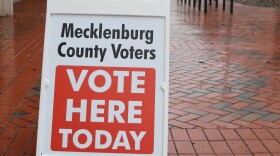North Carolina’s charter school board voted Monday to let two low-performing schools in Charlotte expand dramatically next year. The votes were a test of new powers granted to the charter board last year.
Until last year, charter schools that had been designated low-performing couldn’t expand by more than 20% a year. A 2023 charter bill gave the state’s Charter Schools Review Board authority to approve larger expansions.
American Leadership Academy and Bonnie Cone Classical Academy in Charlotte made their case to the board. Both are run by the Charter One management company.
ALA wants to double its enrollment. Chris Elliott of Charter One told the board that the school — formerly known as Aristotle Prep — moved into a new building in east Charlotte this year and wants to go from just over 125 students now to 250 in August.
“We’re pushing almost 200 applications already for next year,” he said. “So we are hopeful that we can continue to grow that facility. That facility will hold almost 450 students.”
The school has a history of low test scores. ALA Director Carmi Green said testing during this school year indicates things are looking better: “Currently we have 26% of our students in math and 20% of our students in reading who are right on the edge of being proficient.”
That’s obviously still low. Green said virtually all students at the K-7 charter school are students of color from low-income families.
That sparked discussion among charter review board members about the link between poverty and proficiency.
NC State professor Bartley Danielsen serves on the charter review board. He presented a chart mapping academic proficiency and poverty levels for all public schools in Mecklenburg County, charter and traditional. As poverty rose, performance declined for both types of schools.

“While this school may not be performing well on the metrics that we’re currently using, in fact, they’re performing better than comparable schools in the school district,” he said.
Another charter review board member, Rita Haire, cautioned against setting a low bar for disadvantaged students. She’s also on the board of the school choice advocacy group Parents for Educational Freedom in North Carolina.
“I know it’s difficult and it’s challenging, but we have to be mindful that we can fall into that mindset that this is where we’re expected to perform given our demographics,” she said.
Alex Quigley, who leads Durham Charter School, also urged caution.
“Usually growth comes with the understanding that the school’s academically successful. And it just hasn’t got there and there wasn't much data given today to show that it’s in that position,” he said.
Charter review board member Dave Machado sounded a theme that has become familiar during debate over private-school vouchers: Let the parents be the judge.
“The fact that the parents of this area want to go to this school, I don’t know how we could deny those parents the ability to go to a school that I have confidence will be turning around,” he said.
Machado is a former director of North Carolina’s Office of Charter Schools who now works for the Charter Schools USA chain. He joined the majority in a 6-3 vote to approve the ALA Charlotte expansion.
The same split played out in allowing Bonnie Cone Classical Academy, a low-performing K-6 school in Huntersville, to expand from about 530 students to 850.
Eric Sanchez, founder and CEO of Henderson Collegiate charter school, was one of the “no” votes both times. Students will take North Carolina’s end-of-grade exams this month. Sanchez said he’d feel better about waiting for those results and approving rapid expansion if they demonstrate gains.
“I have real concerns that we’re just constantly approving new schools and growth without having the data to back it up,” he said.
The review board did deny one expansion request last month, from Lakeside Charter Academy in Cornelius, a low-performing school that wanted to grow by 23%. At the same meeting, the board approved a request for Valor Prep in Concord to expand by 30%.
State Charter School Director Ashley Baquero said the board didn’t provide much guidance on why it turned down one and granted the other. That clarity would be helpful moving forward, she said, with more expansion proposals expected in June.







